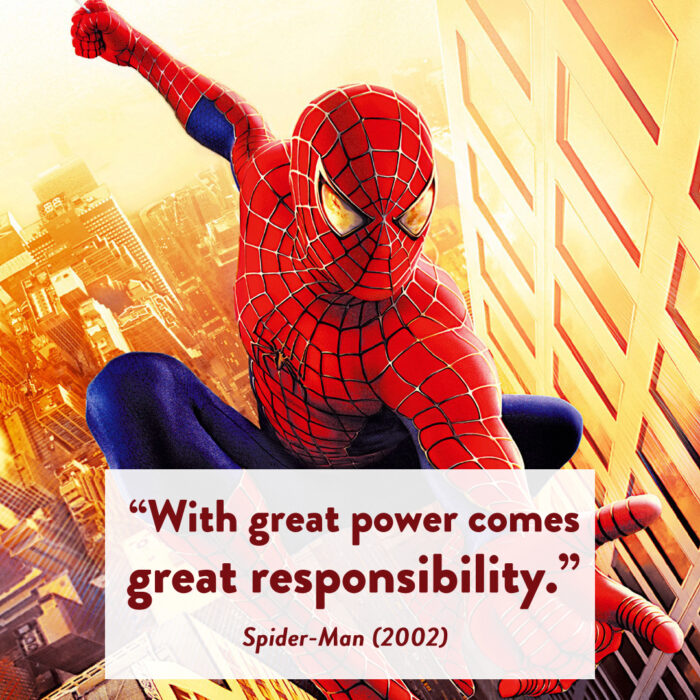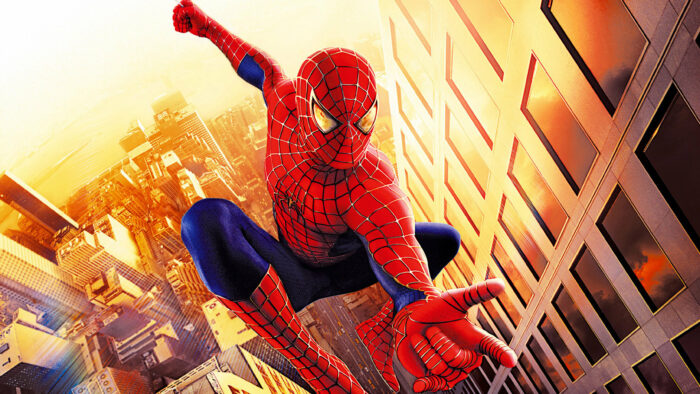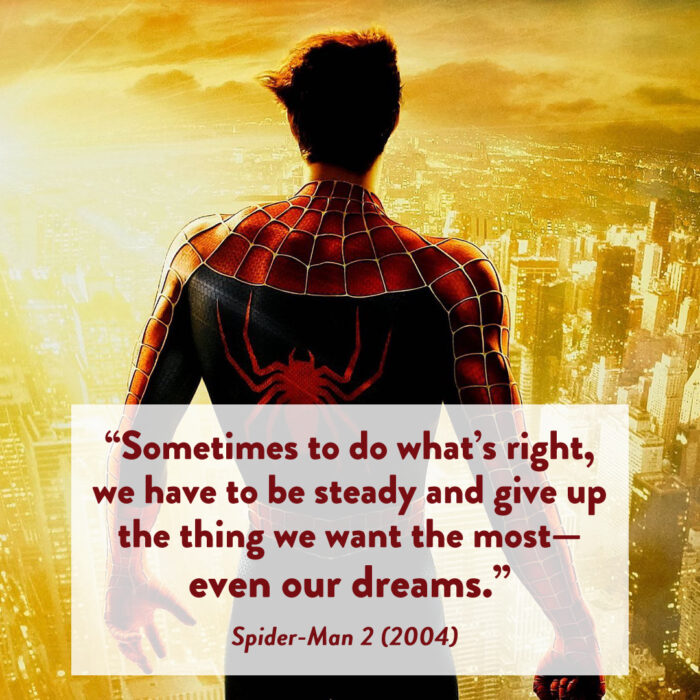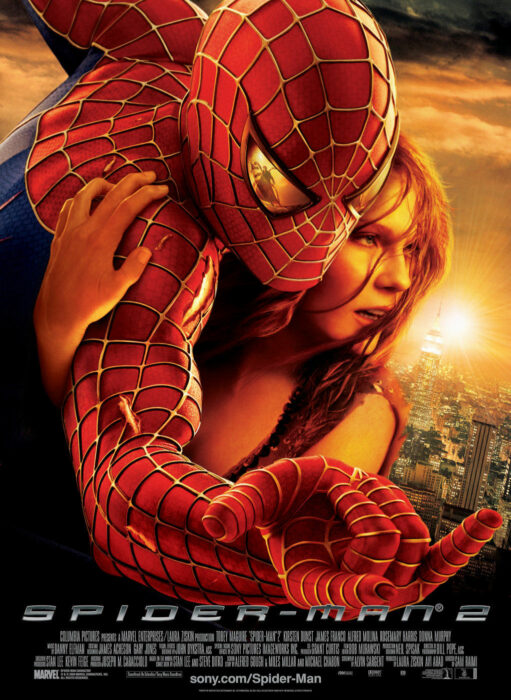How Spider-Man Saved My Marriage Before It Even Began
This month, director Sam Raimi’s original film Spider-Man (2002) turns twenty years old. Here at Lorehaven we don’t always explore superhero movies. Not even when those movies, like Spider-Man, influenced an entire film genre and helped prepare a future age of Marvel Cinematic Universe domination. But when we do, it’s when divine Providence worked in these stories to help change the writer’s personal life.
In my case, I can credit this first modern onscreen Peter Parker, my Spider-Man (Tobey Maguire) for accidental discipleship. I’ve never met this hero, nor dodged falling rubble whilst he was punching at robo-tentacles. Still, I’ve grown to love this heroic trilogy for helping me learn about power, sacrificing dreams—and girls.
Spider-Man (2002): ‘With great power comes great responsibility’
 My real-life love interest might rightly fault me for not dealing with this first. So let’s just come out and say it: Mary Jane Watson (Kirsten Dunst, but don’t blame her) has not aged well. In Raimi’s first film, she’s basically a human MacGuffin. She’s “the girl next door” for Peter Parker to pine for, try to impress, and practice talking with. Later he graduates to sporadic wooing and of course catching her falling from stuff.
My real-life love interest might rightly fault me for not dealing with this first. So let’s just come out and say it: Mary Jane Watson (Kirsten Dunst, but don’t blame her) has not aged well. In Raimi’s first film, she’s basically a human MacGuffin. She’s “the girl next door” for Peter Parker to pine for, try to impress, and practice talking with. Later he graduates to sporadic wooing and of course catching her falling from stuff.
Even Lois Lane (Margot Kidder) of the first Superman films has more personality. So do later heroines like Wonder Woman and Black Widow.
Then of course there’s Spider-Man’s iconic upside-down-kiss-in-the-rain bit. No one talks about that, but it’s frankly inappropriate and further objectifying.1 There—now I at least fulfill my own need to ensure I don’t write another very-Christian article over-praising an Item of Popular Culture.
All that said, I can honestly say that Raimi’s Peter Parker, paradoxically, respected Mary Jane more than the screenwriters or camera lens. When he glimpses her in the next-door window, readying for her day, he does not privately sin against her. Peter treats MJ as a woman of natural dignity and worth.2 In his shy attempts at conversation, he speaks amateurish yet wise words to build her up.
Sure, Peter enjoys wish-fulfillment moments. He gets to save MJ from building drops about eleventeen times, or even rescuing her from thugs. Yet he never tried to make this happen; the story itself is determined to reward his virtue. If anything, Peter later fails not by obsessing over MJ, but by failing to pursue her as he ought.
Lesson 1: No matter how a woman presents herself, or how she is presented by others, you must honor her. With great relationship power comes great responsibility.

Spider-Man 2 (2004): ‘Sometimes to do what’s right, we have to be steady and give up the thing we want the most—even our dreams’
 Last Christmas, audiences rejoiced when (spoiler alert) previous Spiders-Man Tobey Maguire (2002–2007?) and Andrew Garfield (2012–2014?) returned to fight beside Tom Holland’s (2016–20??) current hero. Several villains also returned, among them the best Spider-Man villain, Doctor Octavius (Alfred Molina) from Spider-Man 2.
Last Christmas, audiences rejoiced when (spoiler alert) previous Spiders-Man Tobey Maguire (2002–2007?) and Andrew Garfield (2012–2014?) returned to fight beside Tom Holland’s (2016–20??) current hero. Several villains also returned, among them the best Spider-Man villain, Doctor Octavius (Alfred Molina) from Spider-Man 2.
Doc Ock is the best villain because before he turned evil, he earnestly taught Peter more about great power. Ock raises powerful themes of using one’s privileges not just for personal responsibility, but to help improve the world around you.
Then Doc Ock finds his own gifts of scientific genius turn him into a monster. Peter must deal with Ock as well as New York’s crime, college studies, Aunt May care, and his own repressed feelings for Mary Jane—and that’s when his superpowers fail.
Peter famously throws away his Spidey-suit, choosing to reject heroic righteousness in order to pursue his dream of a normal life, possibly even including Mary Jane.
This time Aunt May shares her advice, hinting strongly that she knows Peter is secretly Spider-Man. Unlike Uncle Ben, her phrase isn’t as pithy as the famous “With great power…” phrase. Yet I literally cannot repeat her wisdom (or comment about this here) without tearing up. “Sometimes, to do what’s right, we have to be steady and give up the thing we want the most,” Aunt May says. “Even our dreams.”
It’s such a beautifully rebellious truth, graciously yet directly spoken against “be yourself/follow your dreams” sentiment, as if to help a real-life collegian’s heart. Here is a hero granted power beyond anyone’s dreams, who finds the responsibility beyond what he can bear. Now that power itself becomes a symbol for your duty.
And some people call superhero movies escapism.
Of course, Peter must re-embrace his responsibility to protect Mary Jane and the whole city from a madman whose gifts have become his idol.3 The fight scenes are spectacular. But so are Peter’s self-sacrifices, which others imitate.
Lesson 2: No matter how much you may feel we deserve our dreams, we must practice surrendering our own “rights” to happiness, even to the point of laying down our lives.
Spider-Man turns 20, while we celebrate 13 years
Later this month, my wife and I mark a blessed thirteen years of matrimony. Our marriage was affected by some drama. I had to apply Lesson 3 from the oft-maligned Spider-Man 3 (2007), discouraging poisonous revenge that can tempt you to lose yourself to the power of a venomous symbiote. That’s worth another article someday (if only to sing the praises of Peter’s cinematic victories over sin).
For now, however, I happily recall how Peter’s gentle courage in pursuing and honoring Mary Jane encouraged me to do the same, starting in 2007, with a far better real-life lady named Lacy. Like our new-bitten hero, I wanted to heed the words of Uncle Ben that incidentally reflect biblical wisdom:
“Everyone to whom much was given, of him much will be required…”
Luke 12:48
And when Lacy’s and my relationship put certain dreams under threat, I was forced to hear another truth from Aunt May, accidentally echoed from the original source:
Those who belong to Christ Jesus have crucified the flesh with its passions and desires.
Galatians 5:24
Peter Parker doesn’t know Jesus, and Spider-Man is best not as a Christ-figure but as a Christian-figure: a flawed hero representing Christians, who are Christ-figures.
So in watching him swing from a thread, I saw a man like myself, trying to do better.
And in taking a look overhead, I saw a greater Man who is the source of greatest power yet perfectly bears greatest responsibility. He even surrendered his divine “dreams” (Philippians 2:5–10) to humbly sacrifice his life to save the world. He tells his people to save much less—to preserve our marriages and other relationships from villainous sins. Sometimes it takes a human hero to help us stick to this Savior.
- Spider-Man 2 (2004) de-objectified Mary Jane, save for maybe one moment when Doc Ock holds her captive. That year I had film stills playing on my laptop’s screen saver, and to the filmmakers’ credit and/or mine, I hadn’t even noticed MJ looking a bit visually exploited. My mom did notice. ↩
- To be sure, Spider-Man 3 (2007) showed drastic exceptions to Peter’s honor, which the story treats as the most horrible things a professing hero could ever do. ↩
- Doc Ock gets serpent-tempted by his own tentacles and everything. ↩


































A worthy celebration of the legacy and lessons of the Spider-Man films! They are still excellent (though flawed, of course), and it’s nice to take time to remember the deeper reasons why.